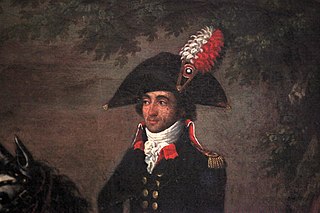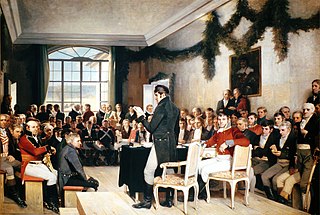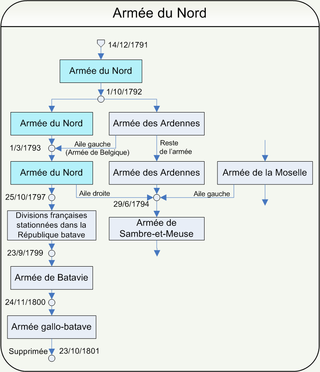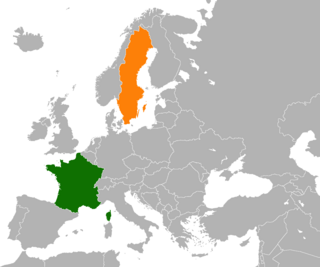

Charles de Suremain (9 October 1762 - 24 September 1835), was a French military and diplomat in Swedish service during the French Revolutionary Wars and Napoleonic Wars.


Charles de Suremain (9 October 1762 - 24 September 1835), was a French military and diplomat in Swedish service during the French Revolutionary Wars and Napoleonic Wars.
He belonged to the French nobility and emigrated in 1792 to become a part of the Armée des Émigrés during the French Revolution.
In 1794, he came to be in service of the Swedish army and instructor of War science of Gustav IV Adolf of Sweden. He also became a favorite of the regent Duke Charles, devoted himself to court service and participated in the contacts between the duke and the Swiss adventurer and Russian spy Christin in 1796.
He served in the Finnish War, was made Adjutant general of Charles XIII and sent to emperor Napoleon I of France to inform him of the Coup of 1809 and negotiate peace for Sweden. He continued to serve in the Swedish army under Jean-Baptiste Bernadotte, took leave during the war against France in 1814 but did participate in the war against Norway. His relationship to Bernadotte was not good, and when he was given a position in Pomerania in 1815, he regarded himself exiled and resigned from Swedish service. He returned to France and settled down as a landowner in Bourgogne.
His memoirs Mémoires du lieutenant-général de Suremain was published in 1902, describing Sweden from his own diary and notes between 1794 and 1815 and regarded[ by whom? ] to be impartial, humble and exact, though his personal emotional attachment of Charles XIII is evident in it.[ citation needed ]

Charles XIV John was King of Sweden and Norway from 1818 until his death in 1844 and the first monarch of the Bernadotte dynasty. In Norway, he is known as Charles III John and before he became royalty in Sweden, his name was Jean-Baptiste Jules Bernadotte. During the Napoleonic Wars, he participated in several battles as a Marshal of France.

Charles XIII or Carl XIII was King of Sweden from 1809 and King of Norway from 1814 to his death. He was the second son of King Adolf Frederick of Sweden and Louisa Ulrika of Prussia, sister of Frederick the Great.

The House of Bernadotte is the royal family of Sweden, founded there in 1818 by King Charles XIV John of Sweden. It was also the royal family of Norway between 1818 and 1905. Its founder was born in Pau in southern France as Jean Bernadotte. Bernadotte, who had been made a General of Division and Minister of War for his service in the French Army during the French Revolution, and Marshal of the French Empire and Prince of Ponte Corvo under Napoleon, was adopted by the elderly King Charles XIII of Sweden, who had no other heir and whose Holstein-Gottorp branch of the House of Oldenburg thus was soon to be extinct on the Swedish throne. The current king of Sweden, Carl XVI Gustaf, is a direct descendant of Charles XIV John.

The Battle of Aldenhoven or Battle of the Roer saw a Republican French army commanded by Jean Baptiste Jourdan defeat a Habsburg army under François Sébastien Charles Joseph de Croix, Count of Clerfayt which was defending the line of the Roer River. A key crossing was won by the French right wing at Düren after heavy fighting. The Austrian retreat from the Roer conceded control of the west bank of the Rhine River to France. The battle occurred during the War of the First Coalition, part of a wider conflict called the Wars of the French Revolution. Aldenhoven is located in the state of North Rhine-Westphalia in Germany about 21 kilometres northeast of Aachen.

François Séverin Marceau-Desgraviers was a French general of the Revolutionary Wars.

Antoine Adolphe Marcelin Marbot, known as Adolphe Marbot, was a French general. He belongs to a family that has distinguished itself particularly in the career of arms, giving three generals to France in less than 50 years. His younger brother, Marcellin Marbot, was also a general.

Louis-Nicolas d'Avout, better known as Davout, 1st Prince of Eckmühl, 1st Duke of Auerstaedt, was a French military commander and Marshal of the Empire who served during both the French Revolutionary Wars and the Napoleonic Wars. His talent for war, along with his reputation as a stern disciplinarian, earned him the nickname "The Iron Marshal". He is ranked along with Marshals André Masséna and Jean Lannes as one of Napoleon's finest commanders. His loyalty and obedience to Napoleon were absolute. During his lifetime, Davout's name was commonly spelled Davoust - this spelling appears on the Arc de Triomphe and in much of the correspondence between Napoleon and his generals.

The Guadeloupe Fund was established by Sweden's Riksdag of the Estates in 1815 for the benefit of Crown Prince and Regent Charles XIV John, also known as Jean Baptiste Jules Bernadotte, and his heirs.

Étienne Maurice Gérard, 1st Comte Gérard was a distinguished French general and statesman. He served under a succession of French governments including the ancien regime monarchy, the Revolutionary governments, the Restorations, the July Monarchy, the First and Second Republics, and the First Empire, becoming prime minister briefly in 1834.

Jean-Baptiste Drouet, Comte d'Erlon was a Marshal of France and a soldier in the Grande Armée during the Napoleonic Wars. He notably commanded the I Corps of the Army of the North at the Battle of Waterloo.

Carl Johan Adlercreutz was a Swedish (Finnish) general and statesman, born in Borgå, Finland on family estates. Entering the Swedish army aged 13 in the Finnish Light Cavalry Brigade, he was present when Gustav III launched his coup-d’etat. He studied military theory in Stockholm.

Claude-Victor Perrin, Duke of Belluno was a French military commander who served during the French Revolutionary Wars and the Napoleonic Wars. He was made a Marshal of the Empire in 1807 by Emperor Napoleon I.

The Swedish–Norwegian War, also known as the Campaign against Norway, War with Sweden 1814, also called the War of Cats or the Norwegian War of Independence, was a war fought between Sweden and Norway in the summer of 1814. According to the Treaty of Kiel, Norway would enter a union with Sweden under Charles XIII of Sweden. The war resulted in Norway being forced into the United Kingdoms of Sweden and Norway, but with its own constitution and parliament. The war marked the last time Sweden participated in an armed conflict with another nation, and its conclusion signalled the beginning of the country's long period of military neutrality.

The Army of the North or Armée du Nord is a name given to several historical units of the French Army. The first was one of the French Revolutionary Armies that fought with distinction against the First Coalition from 1792 to 1795. Others existed during the Peninsular War, the Hundred Days and the Franco-Prussian War.

Charles August or Carl August was a Danish prince. He is best known for serving as Crown Prince of Sweden briefly in 1810, adopted by Charles XIII, before his sudden death from a stroke. Earlier, he had been a general in the Royal Danish Army as well as the Governor-general of Norway. His name before assuming the Swedish title in 1810 was Christian August of Schleswig-Holstein-Sonderburg-Augustenburg, or Christian August of Augustenburg for short.

Marshal of the Empire was a civil dignity during the First French Empire. It was established by Sénatus-consulte/Napoléon Bonaparte on 18 May 1804 and to a large extent reinstated the formerly abolished title of Marshal of France. According to the Sénatus-consulte, a Marshal was a grand officer of the Empire, entitled to a high-standing position at the court and to the presidency of an electoral college.

Jean-Antoine Marbot, also known to contemporaries as Antoine Marbot, was a French general and politician. He belongs to a family that has distinguished itself particularly in the career of arms, giving three generals to France in less than 50 years.

Louis-Victor-Léon de Rochechouart was a French general of the House of Rochechouart fighting in the Royalist, Imperial Russian and Bourbon armies of the Napoleonic Wars.
Jean Castelbert de Castelverd commanded a French division during the French Revolutionary Wars until he lost his nerve during a 1796 battle and was dismissed. In 1792 he assumed command of a volunteer unit. He fought in the War of the Pyrenees against the Kingdom of Spain, winning promotion to general of brigade in 1793 and general of division in 1795. The following year he and his division were sent from Belgium to reinforce the Army of Sambre-et-Meuse which was defending the line of the Lahn River. In the Battle of Limburg in September 1796 he abandoned his position in disobedience to orders even though his troops were not under enemy pressure. He was soon removed from command and retired from the army in 1801.

France–Sweden relations are the current and historical relations between France and Sweden. Both nations are members of the Council of Europe, European Union, NATO and the OECD. In August 2022, France fully ratified Sweden's NATO membership application. France strongly supported Sweden's NATO membership during the latter's accession process.
You can help expand this article with text translated from the corresponding article in Swedish. (December 2017)Click [show] for important translation instructions.
|